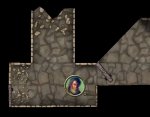The Crimson Binome
Hero
And yet, the consequences of not role-playing a low-Int character as dumb are also detrimental to the whole group. If we're all trying to enjoy this game, and stay invested in our characters, then it hurts suspension of disbelief for everyone at the table for one character to intentionally role-play poorly.You might at most argue that playing dumb if your PC is indeed low-Int is better roleplay than playing it smart. But it is preposterous to pretend that someone has to do it, when the consequences (failing a puzzle) are detrimental to the whole group and when it is impossible for others to do the opposite i.e. roleplay a PC as more intelligent than the player is.
Of course, at that point it's a matter of priorities, since it's also bad for the whole group to be trapped by a puzzle that nobody can pass. (Which raises the question of what would have happened if that one player hadn't been able to solve it; mandatory puzzles with only one solution kind of went out-of-style along with deathtrap dungeons.)
And the difficulty of role-playing a smarter character is a definite issue of discussion, although it possibly warrants its own thread. Suffice it to say that there is no real consensus on the matter. My personal recommendation is to not include an intelligence stat in the game, and just leave that whole thing up to the player to define.



